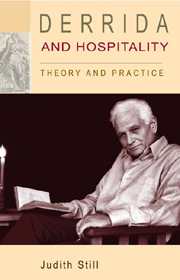Book contents
- Frontmatter
- Contents
- Acknowledgements
- Abbreviations
- 1 Introduction to the question of hospitality: ethics and politics
- 2 Patriarchs and their women, some inaugural intertexts of hospitality: the Odyssey, Abraham, Lot and the Levite of Ephraim
- 3 Friendship and sexual difference: hospitality from brotherhood to motherhood and beyond
- 4 Frenchalgeria – (not) asking for a name, naming, calling by name in tales of Algerians
- 5 The dangers of hospitality: the French state, cultural difference and gods
- 6 Animals and what is human
- 7 Concluding around hospitality
- Bibliography
- Index
5 - The dangers of hospitality: the French state, cultural difference and gods
Published online by Cambridge University Press: 12 September 2012
- Frontmatter
- Contents
- Acknowledgements
- Abbreviations
- 1 Introduction to the question of hospitality: ethics and politics
- 2 Patriarchs and their women, some inaugural intertexts of hospitality: the Odyssey, Abraham, Lot and the Levite of Ephraim
- 3 Friendship and sexual difference: hospitality from brotherhood to motherhood and beyond
- 4 Frenchalgeria – (not) asking for a name, naming, calling by name in tales of Algerians
- 5 The dangers of hospitality: the French state, cultural difference and gods
- 6 Animals and what is human
- 7 Concluding around hospitality
- Bibliography
- Index
Summary
The term welcome of the Other expresses a simultaneity of activity and passivity which places the relation with the other outside of the dichotomies valid for things. (Levinas, Totality and Infinity, 89)
(Accueil de l'autre – le terme exprime une simultanéité d'activité et de passivité – qui place la relation avec l'autre en dehors des dichotomies valables pour les choses. (Lévinas, Totalité et Infini, 62))
The welcoming of the other (objective genitive) will already be a response: the yes to the other will already be responding to the welcoming of the other (subjective genitive), to the yes of the other. (Derrida, Adieu, 23)
(L'accueil de l'autre (génitif subjectif) sera déjà une réponse: le oui à l'autre répondra déjà à l'accueil de l'autre (génitif objectif), au oui de l'autre. (Derrida, Adieu, 51))
Traditional stories about hospitality warn of the dangers of not offering hospitality to gods. In ancient Greece, denying hospitality to gods in disguise was not recommended – likewise in the Old Testament, Sodom's inhospitality to the angels disguised as men in the story of Lot is a crime that is severely punished. Derrida and Cixous point out that today (although not for the first time) it is the arrival of migrants ‘with their Gods’ which seems dangerous and problematic. The previous chapter focused largely on the colonial presence (the uninvited guests) in Algeria, and on those fortunate enough to be more or less welcome to hold French passports: ‘Christian’ (or secular) Europeans whether they originated from France, or perhaps Spain or Germany; and Jews from the time of the Crémieux decree until Vichy removed their citizenship, and then again after Vichy.
- Type
- Chapter
- Information
- Derrida and HospitalityTheory and Practice, pp. 187 - 218Publisher: Edinburgh University PressPrint publication year: 2010



